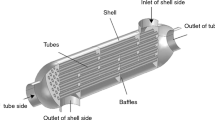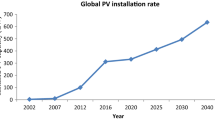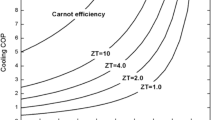Abstract
Based on the theory of finite time thermodynamics, a subcritical simple irreversible organic Rankine cycle (SSIORC) model considering heat transfer loss and internal irreversible losses is established in this paper. The total heat transfer surface area is taken as a constraint, and R245fa is adopted as working fluid of the cycle in the performance optimization. The evaporator heat transfer surface area and mass flow rate of the working fluid are optimized to obtain the maximum power output and thermal efficiency of the SSIORC, respectively. In addition, the influences of the internal irreversibilities on the optimal performances are also investigated. The results show that when the evaporator heat transfer surface area is varied, the relationship between power output and thermal efficiency is a loop-shaped curve, and there exist maximum power output and thermal efficiency points, respectively. However, the two maximum points are very close to each other. When the mass flow rate of the working fluid is varied, the relationship between power output and thermal efficiency is a parabolic-like curve. With the decreases of expander and pump irreversible losses, the performances of the irreversible SSORC are close to those of the endoreversible SSORC with the only loss of heat transfer loss.
Similar content being viewed by others
References
Tchanche B F, Pétrissans M, Papadakis G. Heat resources and organic Rankine cycle machines. Renewable and Sustainable Energy Review. 2014, 39(6): 1185–1199.
Imran M, Usman M, Park B S, Yang Y. Comparative assessment of Organic Rankine Cycle integration for low temperature geothermal heat source applications. Energy. 2016, 102: 473–490.
Mondejar M E, Andreasen J G, Pierobon L, Larsen U, Thern M, Haglind F. A review of the use of organic Rankine cycle power systems for maritime applications. Renewable and Sustainable Energy Review. 2018, 91: 126–151.
Liu B T, Chien K H, Wang C C. Effect of working fluids on organic Rankine cycle for waste heat recovery. Energy. 2004, 29(8): 1207–1217.
Han Z H, Ye Y L, Wang J, Zheng Q Y. Thermal performance analysis of organic Rankine cycle low temperature thermal power generation system based on solar energy. Journal of North China Electric Power University. 2011, 38(6): 75–80 (in Chinese).
Lai N A, Wendland M, Fischer J. Working fluids for high-temperature organic Rankine cycles. Energy. 2011, 36(1): 199–211.
Wang H, Wang H, Ge Z. Optimal design of organic Rankine cycle driven by low-temperature waste heat. World Automation Congress, IEEE, 2012: 1–6.
Quoilin S, Broek M V D, Declaye S, et al. Techno-economic survey of Organic Rankine Cycle (ORC) systems [J]. Renewable and Sustainable Energy Reviews. 2013, 22(22): 168–186.
Liu L, Zhu T, Gao N, et al. Review of Modeling Approaches and Tools for the Off-design Simulation of Organic Rankine Cycle [J]. Journal of Thermal Science. 2018:1–16.
Andresen B. Finite-time Thermodynamics. Copenhagen: University of Copenhagen, 1983.
Bejan A. Entropy generation minimization: The new thermodynamics of finite-size device and finite-time processes. Journal of Applied Physics. 1996, 79(3): 1191–1218.
Berry R S, Kazakov V A, Sieniutycz S, Szwast Z, Tsirlin A M. Thermodynamic optimization of finite time processes. Wiley, Chichester, 1999.
Chen L G, Wu C, Sun F R. Finite time thermodynamic optimization or entropy generation minimization of energy systems. Journal of Non-Equilibrium Thermodynamics. 1999, 24(4): 327–359.
Salamon P, Nulton J D, Siragusa G, Andresen T R and Limon A. Principles of control thermodynamics. Energy. 2001, 26(3): 307–319.
Chen L G, Sun F R. Advances in finite time thermodynamics: Analysis and optimization. New York: Nova Science Publishers, 2004.
Chen L G. Finite-time thermodynamic analysis of irreversible processes and cycles. Higher Education Press, Beijing, 2005 (in Chinese).
Chen L G, Feng H J, Xie Z H. Generalized thermodynamic optimization for iron and steel production processes: Theoretical exploration and application cases. Entropy. 2016, 18(10): 353.
Chen L G, Xia S J. Generalized thermodynamic dynamic-optimization for irreversible cycles-thermodynamic and chemical theoretical cycles. Beijing: Science Press, 2017 (in Chinese).
Bi Y H, Chen L G, Ding Z M, Sun F R. Performance optimization of irreversible air heat pumps considering size effect. Journal of Thermal Science. 2018, 27(3): 223–229.
Mcmahan A, Klein S A, Reindl D T. A finite-time thermodynamic framework for optimizing solar-thermal power plants. Transaction of ASME, Journal of Solar Energy Eng., 2007, 129(4): 355–362.
Bufi E A, Camporeale S, Fornareli F, Fortunato B, Pantaleo A M, Sorrentino A, Torresi M. Parametric multi-objective optimization of an Organic Rankine Cycle with thermal energy storage for distributed generation. Energy Procedia. 2017, 126: 429–436.
Feng Y Q, Hung T C, He Y L, Wang Q, Wang S, Li B X, Zhang W. Operation characteristic and performance comparison of organic Rankine cycle (ORC) for lowgrade waste heat using R245fa, R123 and their mixtures. Energy Conversation and Management. 2017, 144: 153–163.
Dai Y P, Hu D S, Wu Y, Gao Y, Cao Y. Comparison of a basic organic Rankine cycle and a parallel double-evaporator organic Rankine cycle. Heat Transfer Engineering. 2017, 38(11–12): 990–999.
Rodríguez C E C, Palacio J C E, Venturini O J, Lora E E S, Cobas V M, do. Santos D M, Gialluca V. Exergetic and economic comparison of ORC and Kalina cycle for low temperature enhanced geothermal system in Brazil. Applied Thermal Engineering. 2013, 52(1): 109–119.
Sanchez C J N, Gosselin L, Silva A K D. Designed binary mixtures for subcritical organic Rankine cycles based on multi-objective optimization. Energy Conversation and Management. 2017, 156: 585–596.
Chen W J, Qin X Y, Chen L G. Finite time thermodynamic optimization for subcritical simple endoreversible organic Rankine cycle. Thermal Turbine. 2018, 47(2): 105–109 (in Chinese).
Gu W. Theoretical and experimental study of Organic Rankine Cycle for low and medium grade heat source utilization. PhD Dissertation, Shanghai: Shanghai Jiaotong University, 2009.
Elsido C, Mian A, Martelli E. A systematic methodology for the techo-economic optimization of Organic Rankine Cycle. Energy Procedia. 2017, 129: 26–33.
Qing S W. Heat exchange design handbook. Beijing: Chemical Industry Press, 2004 (in Chinese).
Acknowledgments
This work was supported by National Key Research and Development Program of China (Project No. 2017YFB0603503) and the National Natural Science Foundation of China (Project No. 51576207). The authors wish to thank the reviewers for their careful, unbiased and constructive suggestions, which led to this revised manuscript.
Author information
Authors and Affiliations
Corresponding author
Rights and permissions
About this article
Cite this article
Chen, W., Feng, H., Chen, L. et al. Optimal Performance Characteristics of Subcritical Simple Irreversible Organic Rankine Cycle. J. Therm. Sci. 27, 555–562 (2018). https://doi.org/10.1007/s11630-018-1049-5
Received:
Published:
Issue Date:
DOI: https://doi.org/10.1007/s11630-018-1049-5




